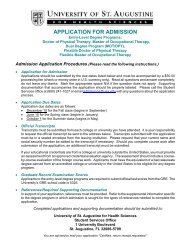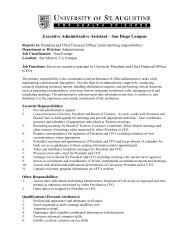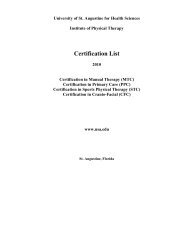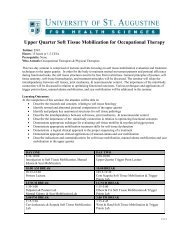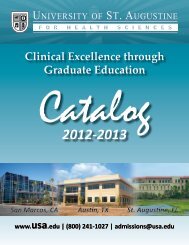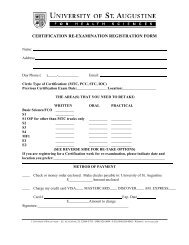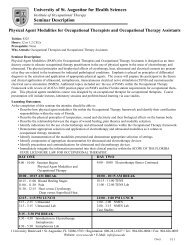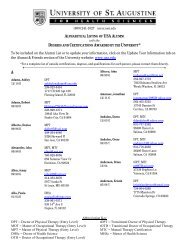OCT 5005 – Clinical Reasoning Hour: 1The student is challenged to apply principles <strong>of</strong> clinical reasoning to occupational therapy practice.Clinical vignettes and situations from previous fieldwork settings will be used to provide insight into theevolution <strong>of</strong> clinical reasoning skills.OCT 5011 – Evidence-Based Practice Hours: 2<strong>St</strong>udents will critique both qualitative and quantitative occupational therapy research designs and developa proposal using the research skills that they learned in their first research class. <strong>St</strong>udents will develop anevidence-based project summarizing the literature on an assigned topic and design a study to test ahypothesis or answer a research question based on available evidence.OCT 5031 – Evidence-Based Research I Hour: 1Faculty/student research team(s) using evidence collected from previous courses, will refine a researchproposal, obtain IRB approval, and implement data collection <strong>for</strong> their research study. Discussions willfocus on sampling and data collection methods that promote internal and external validity.OCT 5041 – Evidence-Based Research II Hour: 1<strong>St</strong>udents will analyze the results <strong>of</strong> the research study and disseminate these results in a pr<strong>of</strong>essionalmanner. Class discussions include using and interpreting statistics, the development <strong>of</strong> effectivepresentation skills, posters, and the process <strong>of</strong> submitting <strong>for</strong> publication, grants, and pr<strong>of</strong>essionalconferences.OCT 5100 – Pr<strong>of</strong>essional Forum Hours: 2This course provides the students with the opportunity to investigate ethical, political and social <strong>for</strong>cesthat shape our national health care delivery system and the practice <strong>of</strong> occupational therapy. Theinfluence <strong>of</strong> personal beliefs and values and cultural orientation concerning ethical issues is examined.<strong>St</strong>rategies <strong>for</strong> examining and responding to ethical dilemmas are explored. Pr<strong>of</strong>essional responsibilities,including continuing competence, licensure/scope <strong>of</strong> practice, supervision <strong>of</strong> therapy assistants andsupporting pr<strong>of</strong>essional associations are discussed. This course uses class discussions and a debate<strong>for</strong>mat as the primary teaching methods to examine controversial issues.OCT 5125C – Biomechanical Interventions Hours: 4This course presents the theory and rationale <strong>of</strong> competency-based occupational therapy and evidencebasedinterventions <strong>for</strong> clients with orthopedic deficits. <strong>St</strong>udents will apply biomechanical frames <strong>of</strong>reference, evaluation and treatment to the specific problems limiting a client’s independence in basic orinstrumental activities <strong>of</strong> daily living. These per<strong>for</strong>mance limitations may include ROM, strength, pain,sensory loss, endurance, work conditioning, posture, ergonomics and other physical disabilities.OCT 5216C - Physical Modalities <strong>for</strong> Occupational Therapy Hours: 2This course is designed to prepare the student in the theory and clinical application <strong>of</strong> physicalmodalities. The physical principles and biophysical effects <strong>of</strong> cryotherapy, heat, ultrasound, electricalcurrents, water and debridement are presented as they relate to treatment <strong>for</strong> indicated pathologicalconditions. Emphases upon the principles <strong>of</strong> differential diagnosis are to be used in theselection/recommendation and application <strong>of</strong> appropriate physical agents.OCT 5300 – Evaluation and Assessment Hours: 4With the Occupational Therapy Practice Framework as a foundation, the students will learn how toadminister and interpret commonly used evaluations and assessments <strong>for</strong> identified disabilities andconditions. Based upon evaluation and assessment results, the students will plan appropriate treatmentinterventions using a case study problem solving approach. Emphasis is given to the development <strong>of</strong>100
therapeutic skills necessary to identify, analyze, design, grade and adapt occupational <strong>for</strong>ms that aremeaningful to clients with varying disabilities that facilitate participation in age appropriate occupations.OCT 5406C – Psychosocial Interventions Hours: 4This course presents the theory and rationale <strong>of</strong> competency-based OT interventions <strong>for</strong> psychosocialdysfunctions across the lifespan (although greater focus is placed upon teenage through senescencepopulations.) <strong>St</strong>udents will apply the mental health frames <strong>of</strong> reference to specific dysfunctional,occupational issues including but not limited to decreased process skills, poor social integration, failureto manage emotional and behavioral problems, failure to adapt to environmental situations, poor role andhabit <strong>for</strong>mation, etc. Client-centered interventions, group process, cultural sensitivity, and evidencebasedpractice lay the foundations <strong>for</strong> learning. This course also discusses the role <strong>of</strong> the OTA in Mental<strong>Health</strong>.OCT 5610C – Neurorehabilitation Interventions Hours: 4This course presents the theory and rationale <strong>of</strong> competency-based occupational therapy and evidencebasedinterventions <strong>for</strong> clients with neurological deficits. <strong>St</strong>udents will apply neurorehabilitation frames<strong>of</strong> reference, evaluation and treatment to the specific problems limiting a clients independence in basic orinstrumental activities <strong>of</strong> daily living. These limitations may include, tone, balance, strength, motorplanning, sensory loss, dysphagia, cognitive/perceptual deficits, or psych-social/behavioral problems.OCT 5620C –Pediatric Interventions Hours: 4This course presents the theory and rationale <strong>of</strong> competency-based OT and evidence-based intervention<strong>for</strong> physical, developmental, sensory integrative, perceptual/cognitive, and psychosocial dysfunctions asit applies to pediatrics. <strong>St</strong>udents will apply pediatric frames <strong>of</strong> reference to specific problems, includinggross, fine and oral-motor skills; behavioral and social issues, handwriting, sensory integrative, visual,cognitive, and psycho-social problems within the framework <strong>of</strong> the multicultural family. This course alsodiscusses the role <strong>of</strong> the OTA in pediatrics.OCT 5630C - Assistive Technology and Community Service Hours: 4This course introduces the student to a variety <strong>of</strong> assistive technology (AT) devices and resources thatpromote independence after disability. Mobility, communication, environment, and activities <strong>of</strong> dailyliving devices are covered. <strong>St</strong>udents participate in numerous community outings that mirror the servicelearning model. <strong>St</strong>udents are required to complete an environmental assessment on a patient in thecommunity and construct an assistive technology device. Funding issues are discussed.OCT 5701C - Orthotics and Prosthetics Hours: 3This course covers the principles <strong>of</strong> orthotic and upper extremity prosthetics. The skills necessary <strong>for</strong> thefabrication and use <strong>of</strong> splints, slings, and other orthotic devices are emphasized.OCT 5801 – Foundations <strong>of</strong> Occupational Therapy – FieldworkIntroduction Hours: 3<strong>St</strong>udents examine the historical foundation and philosophical base <strong>of</strong> occupational therapy. The roles <strong>of</strong>various health care pr<strong>of</strong>essionals and different service delivery models are discussed in relation tomanagement <strong>of</strong> selected case studies. <strong>St</strong>udents are introduced to the occupation paradigm and the majorconceptual models currently used in occupational therapy practice. The use <strong>of</strong> occupations, purposefulactivity and activity analysis are introduced in relation to the Occupational Therapy Practice Frameworkand the importance <strong>of</strong> respecting cultural diversity is emphasized. This course is the first to introduce thestudent to the various types <strong>of</strong> occupational therapy practice settings via site visits. Fieldworkexperiences provide an orientation to occupational therapy and other health care pr<strong>of</strong>essions throughshadowing experiences emphasizing pr<strong>of</strong>essional behavior and communication skills.101
- Page 4 and 5:
San Diego sunsetSt. Augustine and o
- Page 6 and 7:
STUDENT SERVICES ..................
- Page 8 and 9:
DOCTOR OF EDUCATION (EdD) .........
- Page 10 and 11:
San Marcos, California CampusSt. Au
- Page 12 and 13:
certification. A felony conviction
- Page 14 and 15:
In 1996, the Institute of Occupatio
- Page 16 and 17:
Learning Resource CenterThe Univers
- Page 18 and 19:
ENTRY-LEVEL PHYSICAL THERAPY, OCCUP
- Page 20 and 21:
SUMMER 2012 TRIMESTERApril 30Intern
- Page 22 and 23:
TRANSITONAL DOCTOR OF PHYSICAL THER
- Page 24 and 25:
BOARD OF TRUSTEESMr. Joseph Taylor,
- Page 26 and 27:
• Graduate Record Examination sco
- Page 28 and 29:
• The right to inspect and review
- Page 30 and 31:
San Marcos Campus: The full-time DP
- Page 32 and 33:
Transitional Doctor of Physical The
- Page 34 and 35:
Scholarships are awarded to the ent
- Page 36 and 37:
San Marcos Campus - The entry-level
- Page 38 and 39:
Director, will determine if the sub
- Page 40 and 41:
The student obtains and submits the
- Page 42 and 43:
Good Academic Standing StatusPrior
- Page 44 and 45:
Appeal letters should address:• T
- Page 46 and 47:
TUITION AND FEESThe University of S
- Page 48 and 49:
Currently enrolled students who are
- Page 50 and 51:
TRIMESTER IITrimester HoursHSC 5122
- Page 52 and 53:
TRIMESTER IITrimester HoursHSC 5122
- Page 54 and 55:
Dual Degree Option (MOT and DPT)The
- Page 56 and 57:
TRIMESTER IXTrimester HoursPHT 5824
- Page 58 and 59:
Mission StatementThe mission of the
- Page 60 and 61: TRIMESTER XTrimester HoursPHT 5140C
- Page 62 and 63: TRIMESTER IITrimester HoursHSC 5122
- Page 64 and 65: TRANSITIONAL DOCTOR OF OCCUPATIONAL
- Page 66 and 67: Delivery of transitional OTD Course
- Page 68 and 69: BSC 6101 Application of Motor Contr
- Page 70 and 71: TRANSITIONAL DOCTOR OF OCCUPATIONAL
- Page 72 and 73: Delivery of OTD CourseworkCourses i
- Page 74 and 75: Advanced Practice CoursesBSC 6001 F
- Page 76 and 77: TRANSITIONAL DOCTOR OF PHYSICAL THE
- Page 78 and 79: • For the speciality clinical tra
- Page 80 and 81: Craniofacial TrackCourse # Course T
- Page 82 and 83: TRANSITIONAL DOCTOR OF PHYSICAL THE
- Page 84 and 85: • If a Clinical Residency is chos
- Page 86 and 87: Craniofacial TrackCourse # Course T
- Page 88 and 89: DIVISION OF POST-PROFESSIONAL STUDI
- Page 90 and 91: Complete a minimum of one (1) cours
- Page 92 and 93: TUITION AND FEES - Doctor of Health
- Page 94 and 95: A credentialing evaluation from an
- Page 96 and 97: COURSE DESCRIPTIONSPrefix key:BSC -
- Page 98 and 99: scientific literature needed to gui
- Page 100 and 101: EDF 7125 - Organizational Leadershi
- Page 102 and 103: HSA 6101E - Health Services Adminis
- Page 104 and 105: In addition, the course will addres
- Page 106 and 107: individual reasoning and acquired k
- Page 108 and 109: HSC 7300 - Imaging for Physical and
- Page 112 and 113: OCT 5802 - Fieldwork IA Hour: 1This
- Page 114 and 115: OCT 6497 - Capstone Project 2 Hours
- Page 116 and 117: Assignments and course work will em
- Page 118 and 119: elective area of orthopaedic examin
- Page 120 and 121: learning, and skill acquisition. Ne
- Page 122 and 123: PHT 5805 - Practicum II Hours: 2Thi
- Page 124 and 125: anatomical principles for the enhan
- Page 126 and 127: sixth day. Prerequisites are BSC 60
- Page 128 and 129: practice where they will have the o
- Page 130 and 131: DIVISION OF PROFESSIONAL EDUCATIONC
- Page 132 and 133: Sports Physical Therapy Certificati
- Page 134 and 135: Advance Payment ProgramThe Advance
- Page 136 and 137: CLINICAL ORTHOPAEDIC RESIDENCYThe u
- Page 138 and 139: ORTHOPAEDIC MANUAL PHYSICAL THERAPY
- Page 140 and 141: FACULTY FOR CONTINUING PROFESSIONAL
- Page 142 and 143: Robert Stanborough, PT, Assistant P
- Page 144 and 145: Matthew Daugherty, PT, OTR/L, Instr
- Page 146 and 147: Marcia Kessack, RN, Adjunct Faculty
- Page 148 and 149: Marilyn Miller, PT, Associate Profe
- Page 150 and 151: Robert Stanborough, PT, Assistant P
- Page 152: Clinical ExcellenceThrough Graduate



